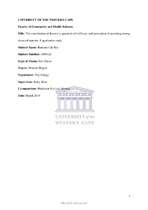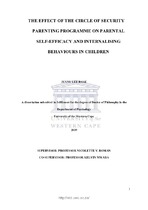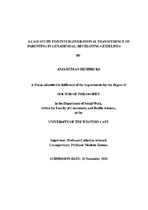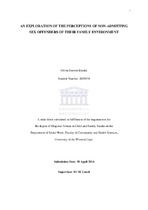The contribution of divorce to parental self-efficacy and perception of parenting among divorced parents: A qualitative study
Abstract
Divorce and self-efficacy are areas that have been studied quite widely and extensively in recent decades. Going through a divorce has an effect on how parents actually parent their children, which in turn has an effect on the behavioral, emotional, social and academic outcomes of the child. Divorce is considered a significant factor in determining emotional and social problems that children begin to exhibit. However, few research has been conducted on the relationship of divorce with parental self-efficacy and perception of parenting among divorced parents in South Africa. Therefore, this study used qualitative interviews to explore the impact of divorce on parental self-efficacy and perceptions of parenting among ten divorced parents from working to middle class community in Cape Town, South Africa. . The interviews were analyzed by making use of thematic analysis. Results showed that, although participants experienced an initial period of extreme emotional distress and feeling overwhelmed at being a single parent, their confidence in their parenting increased over time as they began to adjust to their new lives and received adequate and regular support. This was accomplished through various techniques and coping mechanisms employed by the participants, and with their social support structure playing a significant role on their parental self-efficacy. This study contributes to the research that has been conducted on parental self-efficacy, specifically, the research that has been conducted in a South African context, which has been generally lacking in terms of previous research.
Collections
Related items
Showing items related by title, author, creator and subject.
-
The effect of the circle of security parenting programme on parental self-efficacy and internalising behaviours in children
Rose, Jenny Lee (University of Western Cape, 2019)Early Childhood development is an important phase of development, wherein the trajectory of the child’s life can potentially be determined. However, not all children experience positive outcomes, and many present with ... -
A case study for intergenerational transference of parenting in genadendal: Developing guidelines
Human-Hendricks, Anja (University of the Western Cape, 2014)Parenting practices are known to influence the development of children and family functioning. However, the extent to which these generational influences stretch, and the continuities brought forth between generations has ... -
An exploration of the perceptions of non-admitting sex offenders of their family environment
Davids, Olivia Davene (University of the Western Cape, 2014)This study aims to explore the family environment of non-admitting sex offenders in order to gain insight into the family characteristics that could be contributing factors towards the behaviour of denial. However, the ...




